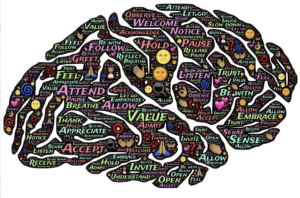Parenting Teens: The difference between Rules and Boundaries (or, between Control and Collaboration)

John Hain, CC0, via Wikimedia Commons
One of the most important things I want parents and caregivers of adolescents to understand is how to engage in developmental relationships. As our kids grow, our relationship with them necessarily has to change over time, to accommodate for the way their brains are developing and the way they are emotionally maturing. The brain needs practice making choices, playing around with ideas of trust and values and identity, and we are in a prime position to help guide that growth and development if we approach it with care and intention.
So many of the families I work with express extreme frustration with getting their tweens and teens to “follow the rules” but I want us to think about the difference between rules and boundaries so that we can start to shift the way we relate to our kids and give them opportunities to practice making good choices.
Rules are about control. Containment. Often, they come from a place of fear, because we are afraid for our kids’ safety. Other times, they come from a desire for respect. But when one person has the ultimate power to make choices for everyone else, this sets up a dynamic where there will necessarily be power struggles. Most adolescents have grown up absorbing ideas about power and control whether we use those words or not – it’s baked into the culture, to society, to many religious traditions, and to our family dynamics. And as they begin to differentiate and figure out how they will move through the world outside of this family structure (to some extent), they begin playing with ideas of where they get to have power, what they can be in control of. This can cause a lot of turmoil in our families as they push back, defy rules, test out just how far they can go.
Boundaries are about relationship, and relationship should be rooted in collaboration and collective care. Ideally, boundaries set up the conditions whereby you and your child can have conversations about what respect looks like, how we coexist in a family when different individuals have unique needs, and when it’s okay to shift things to create opportunities to play/experiment/test out different ways of being.
If we can begin to offer our adolescents some agency in determining some of the norms and agreements by which we all live, they not only get to practice thinking critically (which is key during these years to develop executive functioning in the prefrontal cortex), but they get to experience what it is like to be in a dynamic relationship with others. Kids who grow up with rigid rules set by someone else either go out into the world looking to be the one who is in charge or capitulating to someone who is in charge without knowing how to negotiate to get their own needs met. Kids who have been given the chance to use their voice and be part of a conversation that sets norms for relationships are more able to navigate social and professional situations on their own, and that is what we want.
For the most part, when I think about boundaries, I imagine them to be malleable, often temporary, until we can build trust with one another. (To be clear, if a strong boundary is necessary in order to keep someone safe, and/or the other party/ies are not willing to engage in difficult conversations or negotiation, this is the exception). Trust is an outcome of honest conversations. We have to be willing to take that leap of faith and really listen to our kids, absorb their ideas and perspectives, and take them into consideration in order to build strong, trusting, loving relationships with them. Sharing power and seeing our adolescents as human beings whose needs are just as important as ours are imperative if we are to raise kids who are equipped to go out into the world knowing what it is like to live in harmony with other people.
For more on respect, check out the February 3, 2023 episode of my podcast It’s Relatable, where I talk with Dr. Julie Pham about the different forms of respect.

